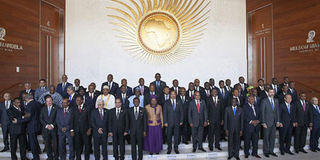African Union heads meet over Burundi, ICC cases

Heads of African states and government are pictured during the opening ceremony of the 24th Summit of the African Union in Addis Ababa on January 30, 2015. African leaders are set to meet in Addis Ababa in January 2016 to discuss among other things Deputy President William Ruto's ICC case and the Burundi crisis. AFP PHOTO | ZACHARIAS ABUBEKER
What you need to know:
AU is against the continuation of cases against Deputy President William Ruto and journalist Joshua arap Sang.
It remains to be seen whether the Arican Union will lead a massive walkout from the Assembly of State Parties (ASP).
Thirty-four countries from Africa are members of the ASP.
The summit is also set to replace President Robert Mugabe of Zimbabwe as the chairperson, whose one year tenure comes to an end.
The case facing Deputy President William Ruto and the crisis in Burundi will top the agenda when Africa Union Heads of State and Government meet in the coming days.
The summit starts on January 21 up to January 31 with the leaders attending meetings at the tail end in Addis Ababa.
In an exclusive interview with the Sunday Nation, AU Commission Deputy Chairperson Erastus Mwencha (Kenyan) said a ministerial committee on ICC headed by Ethiopia’s Foreign minister Tedros Adhanom Ghebreyesus will brief the summit on the progress.
The committee was mandated to engage the United Nations Security Council on the case against Mr Ruto and former radio presenter Joshua arap Sang and also the one facing Sudan President Omar El-Bashir.
ICC'S RELATIONS WITH AFRICA
AU is against the continuation of the cases.
The committee will also report on the relations between ICC and Africa and the way forward.
“ICC will be on the agenda as has been the case in the last few years. This is in line with the decision of the AU Executive Council for the Assembly to receive regular updates on implementation of decisions relating to Africa’s interactions with the ICC,” said Mr Mwencha.
Mr Adhanom was the leader of the AU mission at the 14th session of the Assembly of State Parties (ASP) in November last year where he warned that despite ICC having been strongly supported by Africa at its inception, it is “no longer a court for all”.
While President Bashir remains under a warrant of arrest, the case against Mr Ruto and Mr Sang is headed for the penultimate stage with the duo having completed a no-case-to-answer submissions on Friday.
A WALKOUT
It remains to be seen whether the AU will lead a massive walkout from the ASP.
AU member states are divided with Anglophone states being for mass withdrawal while their Francophone counterparts want Africans to stay put.
Thirty-four countries from Africa are members of the ASP.
President Uhuru Kenyatta, who will be travelling to Addis Ababa, is expected to have a busy schedule as he chairs the African Peer Review Mechanism (APRM) which will also have a separate meeting.
“High on the agenda will be the election of a new chair and the integration of APRM into the AU system,” said Mr Mwencha
The Burundi crisis is also expected to be discussed.
In December last year, the AU Peace and Security Council authorised the deployment of an African Prevention and Protection Mission in Burundi of 5,000 soldiers, for an initial renewal period of six months. Burundi immediately rejected the proposal.
“The Summit will reaffirm the communiqué that was issued by the Peace and Security Council, which has already taken a decision on this. In addition, more discussions on this issue will take place based on any new information or updates that will be presented to the Assembly,” said Mwencha.
It remains to be seen whether the Heads of State will authorise that the troops are deployed in desregard of President Nkurunziza’s threat.
The summit is also set to replace President Robert Mugabe of Zimbabwe as the chairperson, whose one year tenure comes to an end.
Heads of State rotate the chairman’s position from one region to another and this time a head of state from central Africa will take up the position.
“The Heads of State and Government will choose one of their colleagues in that region to steer the ship of the Assembly for the next one year,” said Mr Mwencha.
Also the AU commission leadership is set to be replaced in June.
Chairperson Nkosazana Zuma, who is eligible for re-election having served only one term, is set to go back to South Africa where she is said to be eyeing high political office.
Mr Mwencha has himself completed two terms and his position will be up for grabs.
“The elections for the Commission will be held in June 2016 and the modalities will only be launched once adopted by the Assembly in this Summit. It is only after the call for applications has been made and the deadlines determined that we will know all the candidates who have shown an interest. As of now, it is mere speculation as to who potential candidates are. They will become clearer as the election process commences,” said Mr Mwencha.





